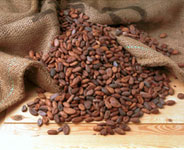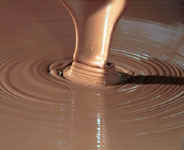|
What's the difference between German, Dutch, and Swiss chocolate?
By searching on "what is" and then "German chocolate," "Dutch chocolate," and "Swiss chocolate," we found a treasure trove of information about these confectionery varieties. The differences are subtle and are related to both brand names and nationality. We were surprised to learn that the famous German chocolate cake doesn't have anything to do with the country of Germany. This rich chocolate cake first appeared in 1957 when a homemaker sent the recipe to a Dallas newspaper. Baker's German's Sweet Chocolate was the key ingredient in the cake. German's Chocolate dates back to 1852, when an American named Sam German created a sweet baking chocolate bar for the Baker's Chocolate Company. This new chocolate had sugar added to it, as a convenience for bakers. But that all important apostrophe and "s" were soon dropped from "German's." In 1828, Dutch chocolate maker C. J. Van Houten invented the cocoa press. This machine squeezed cocoa butter out of the beans and treated the cocoa with an alkalizing agent to improve the color and flavor. The process became known as "dutching," and cocoa processed this way is called Dutch chocolate. Swiss chocolate, on the other hand, simply refers to the confection's nationality. The Swiss are perhaps the European masters of chocolate and the pioneering chocolatiers in this mountain country have refined the making of candy into high art. Thanks to the output of their plentiful cows, the Swiss invented milk chocolate in 1875 and "melt in the mouth" chocolate soon after. Swiss chocolates won numerous awards in the early 20th century, which further solidified the country's reputation for fine chocolate.
|

|
